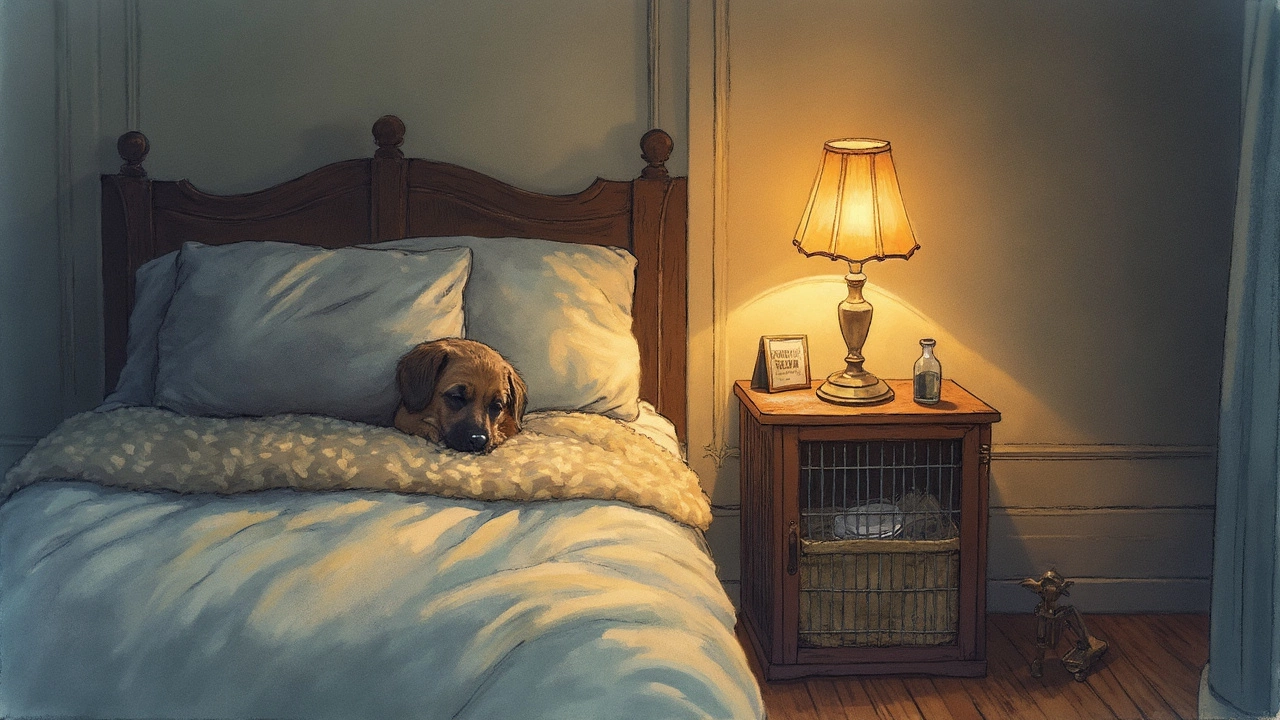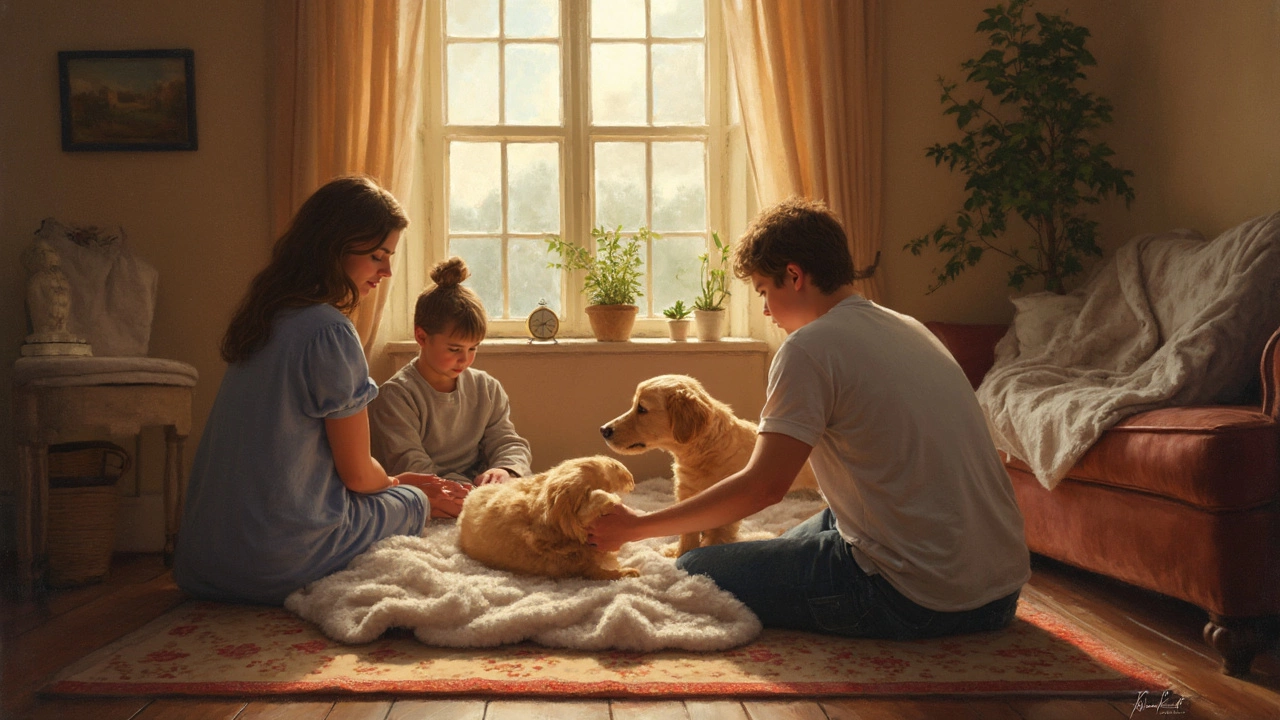Bringing home your new puppy for their first night can be a whirlwind of excitement and nerves, both for you and the little furball. So, where should this tiny bundle of energy sleep? Well, setting up a cozy and secure spot is key. Think about a snug area where they can feel safe, whether that's a dedicated corner of your room or even nursery in your house. The idea is to make them feel like they're not alone in a strange place without overwhelming them with too much space.
Now, many folks wonder - should it be a crate or a bed? Crates tend to get a bad rap, but they can offer a sense of security, kinda like a den. Plus, they’re super useful for night-time housetraining. Just make sure it’s not too big. The goal is a space just large enough for them to stand up and turn around, so they feel snug.
- Setting Up a Cozy Space
- Choosing Between Crate or Bed
- Managing Nighttime Anxiety
- Using Familiar Scents for Comfort
- Establishing a Nighttime Routine
- What to Expect From Your Puppy
Setting Up a Cozy Space
Creating a cozy sleeping area for your new pup isn't just about comfort; it's about giving them a spot that feels like home from night one. You want somewhere that's just right, not too confined, but also not so large it feels overwhelming. Think about a space where they can sense your presence, which helps soothe any first-night jitters.
First off, you need some soft bedding. Old towels or blankets work wonders—just make sure there are no loose threads or holes for those little teeth to get caught up in. Keep in mind, young puppies are sensitive to temperature changes, so line their bed with a nice layer to keep them warm.
Another pro tip? Use a small ticking clock wrapped in a towel. This mimics the heartbeat of their mom or siblings, which can help make them feel right at home. Some folks also use a fluffy toy for them to cuddle up with. If a crate's in your plan, it should be a positive space, not a penalty box. Toss in some safe chew toys or treats. The idea is to keep them entertained, especially if they wake up during the night.
If you want to get a bit techy, consider a puppy-safe heating pad set on low beneath their bedding. It's a neat trick to mimic body heat without adding any danger to your snuggly setup.
Lastly, don’t forget about positioning. Near your own sleeping area is best, so they can catch your scent and hear your calming heartbeat or breathing. Puppies might get a bit vocal the first night, but knowing you're nearby helps ease their anxiety, and soon they’ll sleep soundly through the night.
Choosing Between Crate or Bed
When it comes to deciding whether your new puppy should sleep in a crate or a bed, it can feel like choosing between two schools of thought. Each option has its perks, so let’s break it down a bit.
Crates are often a popular choice for young pups. Think of them like a cozy little den that taps into their natural instincts. A crate can give a puppy a sense of security and help with things like housetraining—because most dogs prefer not to mess where they sleep. Plus, if you get them used to it early on, it can be a safe haven for travel or vet visits in the future.
On the other hand, some folks prefer a puppy bed. It's all about the freedom of space and the chance for a pup to stretch out as much as they like. If you choose a bed, be sure it’s comfy with soft, durable material, and placed in a quiet part of the home where your puppy can relax without being disturbed by foot traffic or loud noises.
Here’s a quick list to help you decide:
- Crate: Helps with training, perfect for anxious puppies needing a comforting space.
- Bed: Ideal for more relaxed pups who love stretching out, great when crate training isn’t a priority.
Some puppy parents even start with a crate and later transition to a bed as their furry friend grows and becomes trained. In the end, consider what’s best for your pup's personality and your lifestyle. Whatever you do, creating a warm and welcoming sleeping environment is the top priority.
Oh, and a little expert tip: Use a blanket or old shirt with your scent near their sleeping area—whether crate or bed. It can really help soothe their anxieties and get them settled into their new home.
Managing Nighttime Anxiety
It's pretty common for puppies to feel a bit anxious their first night away from their litter. Think about it: they've been used to being surrounded by their siblings and all of a sudden, they're in a new place with unfamiliar smells and sounds. Naturally, this can spark some anxiety. But no worries, there are ways to help your new furry friend settle in comfortably.
First things first, a comforting presence can work wonders. Keeping the puppy's sleeping area near you, like placing their crate or bed next to yours, helps them feel secure. For some pups, just knowing that you're close by can make all the difference. It makes them feel like they're not totally alone in the world.
Another trick? Use familiar scents. Grab an old t-shirt or towel (unwashed) that smells like you and place it in the crate or bed. The familiar scent can provide a sense of safety and comfort to ease them through the first night transitions.
Noises can also be a big hurdle for puppies. You could use a white noise machine or even a ticking clock wrapped in a blanket. These sounds mimic the heartbeat of mother dogs, giving them a sense of the familiar and helping them relax.
- Create a calm atmosphere: Dim the lights a bit and keep the environment quiet. Loud noises and bright lights can make anxiety worse.
- Keep a consistent routine: Puppies love routine. Feeding, bathroom breaks, and sleeping should happen around the same time every day. This consistency helps them know what to expect.
- Avoid immediately responding to cries: It's tough, but sometimes rushing in at the first whimper teaches them that crying equals attention.
Remember, with patience and the right approach, your little buddy will soon feel at ease. Each puppy is unique, so it might take some time to find what really suits your new friend, but hang in there, it'll be worth it in the end.

Using Familiar Scents for Comfort
Ever notice how comforting familiar smells can be? The same goes for your new puppy, especially on their first night in a strange place. One easy trick is to use items that hold familiar scents to help reassure your pup.
Before bringing your puppy home, take a blanket or piece of cloth to your breeder's place or wherever your puppy is coming from and let it soak up the scent of their mom or littermates. When it's time for bed, placing this item in their sleeping area can work wonders for soothing nervousness.
Another trick is adding something with your scent. Your worn t-shirt can act like a security blanket for them. It's all about creating a mix of comforting smells that remind them they're in a safe, loving environment. Adding a few drops of puppy-safe essential oils, like lavender, can also provide extra comfort.
Did you know that dogs have up to 300 million olfactory receptors in their noses, compared to about six million in humans? This means that their sense of smell is incredibly powerful, so bringing in these scents can really make a difference.
If you're into charts, here’s a quick overview:
| Item | Reason for Comfort |
|---|---|
| Blanket from Breeder | Familiar scent of home ties |
| Your T-shirt | Carries scent of a new loving figure (that’s you!) |
| Puppy-safe Essential Oils | Introduce calming effects with care |
Integrating these familiar scents not only makes the first night manageable but also sets good groundwork for future nights. So, while setting up that perfect puppy sleeping arrangement, don’t underestimate the power of smell!
Establishing a Nighttime Routine
Setting up a nighttime routine for your new puppy is essential for both of you to catch those much-needed Z's. Puppies are creatures of habit, and a consistent routine will help them settle down.
Start by deciding on a bedtime that works for your household. Puppies need a lot of sleep, around 18-20 hours a day, so winding down early is beneficial. Before bedtime, make sure your puppy has had a chance to wear off energy with some playtime or a gentle walk. This helps them relax and indicates it's getting close to sleep time.
Next, a bathroom break is a must before bed. Puppies have small bladders, and taking them out right before bedtime can cut down on nighttime accidents. Some folks find a last-minute potty schedule helps a lot in reinforcing their training.
Once they're back inside, have a short and soothing bonding session. Try gentle petting or a little cuddle time—just a few minutes of calm interaction can signal it's time to wind down for the night.
Stick to the same spot for sleep every night to let your puppy know that's their designated resting area. Whether it's in their crate or on their bed, consistency will make them feel secure.
- Consistent bedtime and wake-up time signal routine.
- Pre-bedtime potty breaks prevent night accidents.
- Quiet bonding moments calm your puppy.
- Consistent sleeping location creates security.
If your puppy seems anxious, consider using a white noise machine or a ticking clock nearby. These sounds can mimic a comforting heartbeat, easing their first night jitters.
Over time, you'll notice that your new puppy's sleep patterns become more predictable, and this will give both of you a more restful night's sleep.
What to Expect From Your Puppy
So, you're all set for your puppy's first night, but what exactly should you expect when the lights go out? Well, be ready for some cute, sleepy chaos. Your new puppy might be a bit anxious from all the changes, and that could mean a bit of whining or restlessness as they get used to their new surroundings.
Puppies are like toddlers; they’re not used to sleeping through the night just yet. It's pretty normal for them to wake up a few times, either because they need a bathroom break or just want some reassurance. Make sure to stay calm and patient, as this phase doesn't last forever. According to Dr. Rosie Williams, a veterinarian who specializes in animal behavior, "Most puppies settle down after the first couple of nights, especially when they know there’s someone nearby who loves them."
You'll also notice their natural instincts kicking in. When it's dark, your puppy might be a little more on edge, but during daylight or when there's some soft light, they tend to relax and snooze a bit more. Imagine being in a completely new place filled with unfamiliar smells and sounds—it's a lot for a little pup!
- Expect them to nap a lot during the day, too. Puppies need plenty of sleep to grow and develop properly.
- Be ready for spurts of energy. They’ll have bursts of playfulness followed by sudden crashes for naps.
- Don't be surprised if your puppy wants to be near you as much as possible. It helps them feel secure and loved.
Your goal is to make them feel safe and comfortable, so they start trusting their new home. Using a crate can be great for this, as noted earlier. Just remember, a few sleepless nights now will pay off in the long run as your puppy starts adjusting to their new routine.

